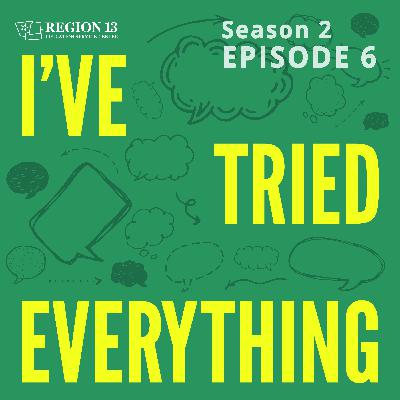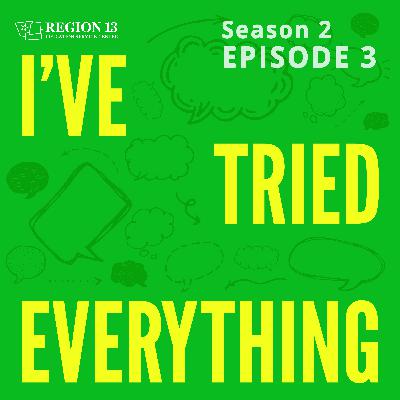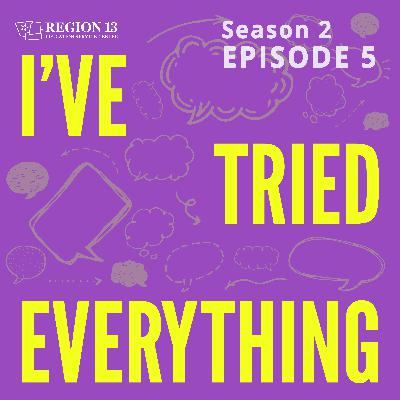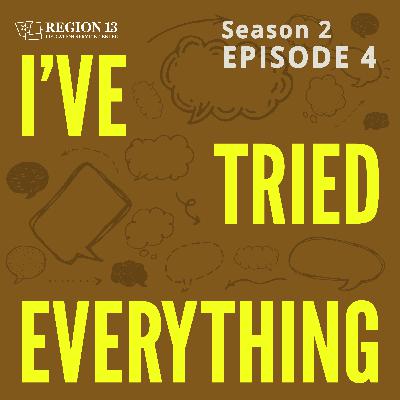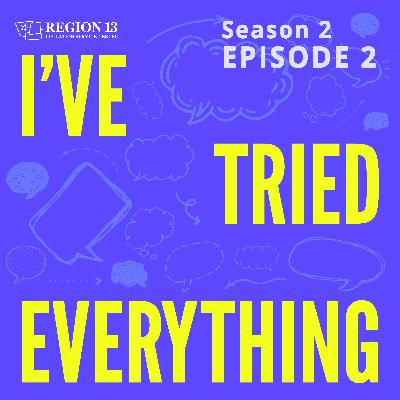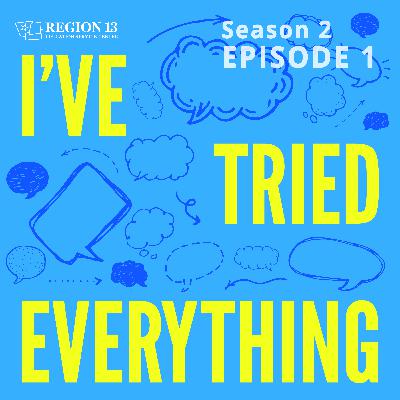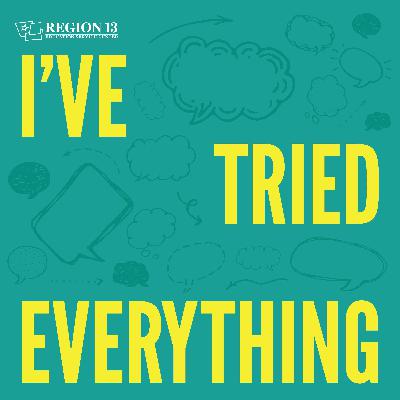S2-Ep6 - Addressing The Staff Shortage
Description
Angela:
Welcome back to "I've Tried Everything," a podcast focusing on behavior supports in schools. I'm your host, Angela Isenberg, Project Coordinator at Region 13. Every week I talk with educators just like you. We cover some tough topics, share stories, and explore what works and what doesn't. Let's go. I'm very excited to be joined today by Whitney Brown. She is over special programs in Smithville ISD. Whitney and I have had a longstanding relationship. We used to be colleagues together, an eon ago, a very long time ago. We worked together on a ninth grade campus, Bastrop ISD. And I feel very lucky that we have her on our podcast. She has been a high school teacher, an elementary, middle school teacher, special ed, gen ed, administrator, testing. She's been at Central Office. What else have you done in the world of education?
Whitney:
I was actually also a para for a little bit when I first got it started in content mastery and then in PE. Me, a PE para. That's kind of unreal right there.
Angela:
Yeah, she can't catch anything. It's really funny.
Whitney:
It's a family rule.
Angela:
Knowing that you've been in education for a while, and you've held a lot of different positions in a lot of different areas, how have you seen behavior change from 20 years ago to behaviors now that we're seeing on some of the campuses?
Whitney:
My philosophy is kids are kids. Kids are the same now as they were previously and they react to that environment around them that has changed. So a lot of the behaviors that we see change are sometimes just due to environment. Kids respond to us the same way they would have if we have good structures in place and good procedures in place. I don't feel like that has changed so much. I think it's how they're interacting with the world that has led to some of these behaviors that we are seeing more of. But I do feel like a lot of those are stemming from social, emotional aspects, to trauma, or even secondary trauma. I feel like we see a lot of kids are like, "I know this happened to my friend," and they have behaviors then that stem perhaps from what I think of as secondary trauma with kiddos.
I do see more incidences of some aggressive behaviors, whereas in the past if a student had started to become aggressive, they were just taken away. We didn't have to deal with following through with that and helping the kid come up with a plan or recover from that. Whereas now I feel like we are so much more focused on that on campuses and as a society in general as that's really is an important aspect of how we're helping kids grow. And because that is in place, we do see more of those behaviors on campuses.
Angela:
I think it's where that knee-jerk reaction in the past was just, send them to a discipline alternative campus, or OSS, out of school suspension kind of thing. Where now we're looking at, what was the root cause of the situation, let's investigate all of that. Then we also have lots of protections that are out there. If you look at Chapter 37 in the State of Texas, there's a lot of different things as an administrator that you have to look at differently now than we did 20 years ago. In education, for example, you have to look at the students' lives and their experiences, and have some of those experiences impacted how they're behaving on campus, which I think a lot of people aren't aware of what all is in Chapter 37 that exists out there.
Whitney:
Absolutely. Unless you've had to go through that training. And why would they know? Why would teachers know they're not having to sit in Chapter 37? Their first job is instruction. And there's not necessarily a reason for them to know all the nuts and bolts of it, but it does help for them to be aware of certain things. And sometimes you can clarify those, if a kid comes to you as an administrator, and you have to exact a consequence in a certain way, a teacher doesn't understand, and you can say, "Well this is why this has to be this way." And most teachers are reasonable and they'll understand that. A lot of the things we do are based on empathy and just empathy for this kid. Like I can understand you have this trauma, and this is why, and let's help you get through that. So I think we've put some things in place and changes in legislation that are almost like a forced empathy. We want you to be aware of this. So helping teachers be able to see that as to the why, instead of being so focused on the punitive side of things has been a beneficial change that I've seen in my 23 years.
Angela:
How is Smithville right now with your staff? Are y'all still looking for some teachers or paraprofessional though? So anybody listening, Smithville might be hiring.
Whitney:
We do. I am short two certified SPED teachers at my elementary. And I will say our kids in Smithfield are great. I've worked in a big district, I've worked in a small district, and guys, we still talk about, "Oh they're not following the dress code." And my philosophy is if you're worried about the dress code then you really don't have big problems. But I do have at least three SPED positions currently open in addition to some other gen ed positions. But yeah, I get to focus on special programs. Please come out. And we give stipends. We're giving a retention bonus in January. Help you pay off your credit card bills from Christmas. Then another one in June. We are trying to stay competitive with pay because we know we're competing more with big schools more so than little schools our size.
Angela:
Thinking about the teacher shortage that is existing. Paras, substitutes, everything in between. What is at least a couple of things that you feel like could be done to address the teacher short? If somebody asks you, and you were on the Texas Task Force for addressing the shortage, what would you add to their plate to think about?
Whitney:
I feel like at an advantage, because I do have a close friend who is on that Task Force, and so I kind of plugged things in his ears. But number one, it is what can we take off their plates? If your campus is doing some data collection, or a grading process, or if there is something happening on your campus that what I consider fluff, or not completely necessary, we've really got to prioritize what we're doing with our time, and ensuring that the time teachers do have is useful. Then the other one is, what can I do to give teachers back time? Our elementaries have a pretty robust PLC structure in place, so they are getting some time... Let's be honest guys, 45 minutes, five times a week is not enough of a conference period.
So those are things I'm always trying to advocate for in this kind of newish role I'm in at Central Office. It's very different vibe for me 'cause I'm used to being in the trenches. But trying to continue to advocate, or even looking through and helping campuses process through, what is the main priority? We want teachers to do this new thing because it's more efficient, but we're going to get rid of these other two things we were doing. I think we just have to be more efficient in the way we're getting teachers to do the things that we have to do if it's to meet compliance, or a new legislative requirement, or even how we process through data to help making sure kids are making progress. That we're doing things efficiently for teachers.
Angela:
We were having a conversation earlier today about, we add to the plate, but we very rarely take off the plate. And we don't reevaluate, how do things fit together. A lot of times our teachers don't feel like they have permission to take things off their plate. They've been in a training two or three years ago on something, and nobody told them that they don't have to keep doing whatever it is that they got training in. I think for behavior, I've seen campuses do conscious discipline, restorative discipline, Harry Wong's "First Days of School," Fred Jones' "Tools for Teaching." But if you never say, "Hey guys, this is the direction we're headed, you can let go of some of those practices that we were saying you had to have in place before," it makes it really challenging for teachers to navigate and know, this is what I'm supposed to do. Especially for our veteran teachers. For brand new teachers, sometimes they don't know what to put on the plate.
Whitney:
Sometimes they don't even know where the plate is, bless their hearts. It's trying to support them, and again, it all goes back to what are you prioritizing? I think so many times, because accountability is still hanging over our heads, and it's such a driving force in what we do, even though I do like a lot of the things that are happening with the redesign because I feel like it will truly more mirror what we do in the classroom on a daily basis. But we've got to really look hard at how we are monitoring progress. I think that's one of our greatest areas for efficiency. We don't need necessarily multiple, multiple things. We can condense things into something simple. And not only that, let our programs work for us. Giving teachers the access that they need. One of the best things we did when I was an admin on a campus was we made sure all teachers had complete access to what they needed. They didn't have to wait for me to run the report to get it to them. I mean, because essentially it's their data, not mine. And what we worked hard to do was to teach them how to look at that data.
I'm very much not an enabler personality. I'm like, "You're an adult. You're skilled. I can teach you how to do this, and then you can do it for yourself. And then you can be more independent. And be able to do those on your own. Because I can't hold your hand through this forever." Especially when you're in a small district and you don't have a whole team of people to support that. It

